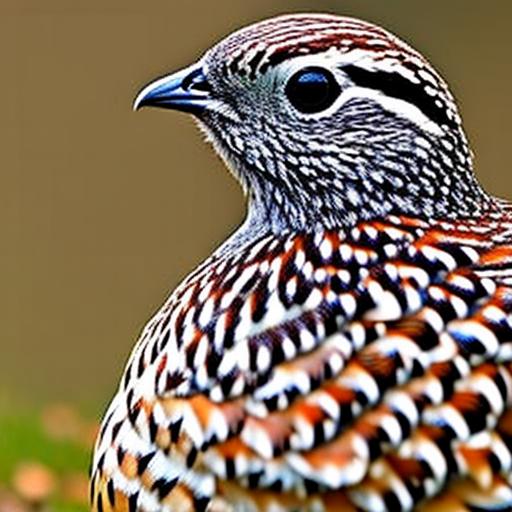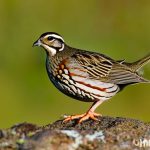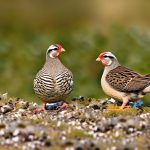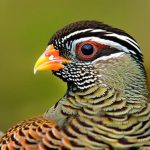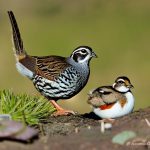Quails are small, ground-dwelling birds that are known for their social behavior and strong flocking instincts. They are highly active during the day, foraging for food and dust bathing in the wild. When kept in captivity, it’s important to provide them with enough space to exhibit these natural behaviors. Quails are also known for their ability to fly short distances, so it’s crucial to have a covered enclosure to prevent them from escaping. Additionally, quails are sensitive to stress and can be easily startled, so it’s important to handle them gently and provide a calm and quiet environment.
Quails have specific needs when it comes to nesting and roosting. They prefer to nest in secluded areas with plenty of nesting material such as straw or hay. Providing them with nesting boxes or shelters will help them feel secure and encourage natural breeding behaviors. Quails also need access to clean water for drinking and bathing, as well as a balanced diet to maintain their health and well-being. Understanding these basic behaviors and needs is crucial for providing proper care and ensuring the overall welfare of your quail flock.
Key Takeaways
- Quail are social birds that require space to roam and dust bathe, and they prefer to roost off the ground.
- When choosing housing for quail, consider factors such as ventilation, predator protection, and ease of cleaning.
- Quail require a balanced diet of commercial feed, fresh greens, and clean water to thrive and lay eggs.
- Creating a safe environment for quail involves securing the housing from predators and providing adequate lighting and temperature control.
- Regular health checks, parasite control, and maintaining clean bedding are essential for managing quail health and hygiene.
Choosing the Right Quail Housing
When it comes to housing quails, there are several options to consider, depending on the size of your flock and the space available. For smaller flocks, a simple coop or hutch with a secure outdoor run can provide ample space for quails to roam and forage. For larger flocks, a purpose-built aviary or pen may be more suitable. It’s important to ensure that the housing provides protection from predators such as foxes, raccoons, and birds of prey, as well as shelter from the elements.
The flooring of the quail housing should be covered with a layer of soft bedding such as straw or wood shavings to provide a comfortable and clean environment for the birds. Additionally, providing perches or roosting bars will give the quails a place to rest and feel secure. The housing should also have good ventilation to prevent the buildup of ammonia from droppings and to maintain a healthy environment for the birds. Overall, choosing the right quail housing is essential for providing a safe and comfortable living space for your flock.
Providing Proper Nutrition and Water
Quails require a balanced diet to maintain their health and productivity. A commercial quail feed that is specifically formulated for their nutritional needs is the best option for providing essential vitamins, minerals, and protein. Additionally, offering a mix of grains and seeds can provide enrichment and encourage natural foraging behaviors. It’s important to ensure that the feed is always fresh and free from mold or contaminants.
In addition to a balanced diet, quails need access to clean water at all times. Water is essential for digestion, temperature regulation, and overall well-being. Providing water in shallow dishes or containers that are easily accessible will ensure that all quails have enough to drink. It’s important to regularly clean and refill the water containers to prevent the buildup of bacteria and algae. Overall, providing proper nutrition and water is crucial for maintaining the health and productivity of your quail flock.
Creating a Safe and Secure Environment
Creating a safe and secure environment is essential for protecting quails from predators and ensuring their overall well-being. This includes securing the housing with sturdy wire mesh to prevent entry from predators such as foxes, raccoons, and birds of prey. Additionally, it’s important to regularly inspect the enclosure for any signs of wear or damage and make repairs as needed.
Quails are also sensitive to extreme temperatures, so it’s important to provide shelter from the sun and wind, as well as insulation during colder months. Providing shade in the form of trees or shelters will help regulate the temperature and provide a comfortable environment for the birds. It’s also important to keep the housing clean and free from droppings and debris to prevent the buildup of bacteria and parasites. Overall, creating a safe and secure environment is crucial for protecting quails from harm and ensuring their overall welfare.
Managing Quail Health and Hygiene
Maintaining good hygiene practices is essential for managing the health of your quail flock. This includes regularly cleaning the housing and removing droppings, old bedding, and any spilled feed. It’s important to use disinfectants that are safe for use around quails to prevent the buildup of bacteria and parasites. Additionally, providing dust baths with fine sand or diatomaceous earth will help control external parasites such as mites and lice.
Regular health checks are also important for managing quail health. This includes monitoring for signs of illness or injury, such as lethargy, loss of appetite, or abnormal behavior. It’s important to quarantine any sick or injured birds to prevent the spread of disease within the flock. Providing a balanced diet, clean water, and a stress-free environment will also help maintain the overall health and well-being of your quail flock.
Monitoring Quail Egg Production

If you are keeping quails for egg production, it’s important to monitor their laying patterns and egg production. Quails are prolific layers, often laying an egg almost every day. However, factors such as age, diet, stress, and lighting can affect their laying patterns. Providing a balanced diet with adequate protein and calcium will help support healthy egg production.
Monitoring the number of eggs laid by each bird will help identify any issues with individual hens or with the flock as a whole. It’s important to collect eggs regularly to prevent them from being damaged or eaten by the birds. Additionally, providing nesting boxes with soft bedding will encourage natural nesting behaviors and help protect the eggs from damage. Overall, monitoring quail egg production is essential for maximizing productivity and ensuring the overall welfare of your flock.
Building a Sustainable Quail Keeping Routine
Building a sustainable quail keeping routine involves establishing good management practices that promote the health and well-being of your flock while minimizing environmental impact. This includes implementing efficient waste management practices such as composting droppings and used bedding to create nutrient-rich fertilizer for gardens or crops. Additionally, using natural pest control methods such as introducing beneficial insects or birds can help manage pests without the use of harmful chemicals.
It’s also important to consider sustainable sourcing of feed and bedding materials to minimize environmental impact. Choosing organic or locally sourced feed can reduce the carbon footprint of your quail keeping operation. Additionally, using renewable energy sources such as solar power for lighting or heating can further reduce environmental impact. Overall, building a sustainable quail keeping routine involves making conscious choices that promote the health of your flock while minimizing environmental impact.
Looking to expand your poultry keeping skills beyond quails? Check out Poultry Wizard’s article on “What Should You Feed Ducks?” to ensure you’re providing the best nutrition for your waterfowl. And if you’re considering a large chicken coop, their piece on “Large Chicken Coop Ideas” offers valuable insights and inspiration. Plus, learn about the ideal location for your chicken coop in their article “Where to Put Chicken Coop.” With these resources, you’ll be well-equipped to create a thriving and diverse poultry setup. (source)
FAQs
What is a quail keeper?
A quail keeper is a structure or enclosure designed to house and protect quail, providing them with a safe and comfortable environment to live and lay eggs.
What materials are needed to build a quail keeper?
Materials needed to build a quail keeper may include wire mesh, wood for framing, roofing materials, hinges and latches for doors, and any additional materials for insulation or predator protection.
What are the key considerations when building a quail keeper?
Key considerations when building a quail keeper include providing adequate space for the quail, ensuring proper ventilation, protection from predators, and easy access for cleaning and egg collection.
Are there different designs for quail keepers?
Yes, there are various designs for quail keepers, including simple wire mesh enclosures, wooden hutches, and larger aviary-style structures. The design chosen will depend on the number of quail being housed and the available space.
Do quail keepers need to be insulated?
Insulation can be beneficial in colder climates to help regulate the temperature inside the quail keeper. However, in warmer climates, insulation may not be necessary.
How can I predator-proof a quail keeper?
To predator-proof a quail keeper, ensure that all openings are securely covered with wire mesh, and consider adding a buried wire apron around the perimeter to prevent digging predators from gaining access. Additionally, make sure that doors and latches are secure.
Meet Walter, the feathered-friend fanatic of Florida! Nestled in the sunshine state, Walter struts through life with his feathered companions, clucking his way to happiness. With a coop that’s fancier than a five-star hotel, he’s the Don Juan of the chicken world. When he’s not teaching his hens to do the cha-cha, you’ll find him in a heated debate with his prized rooster, Sir Clucks-a-Lot. Walter’s poultry passion is no yolk; he’s the sunny-side-up guy you never knew you needed in your flock of friends!

